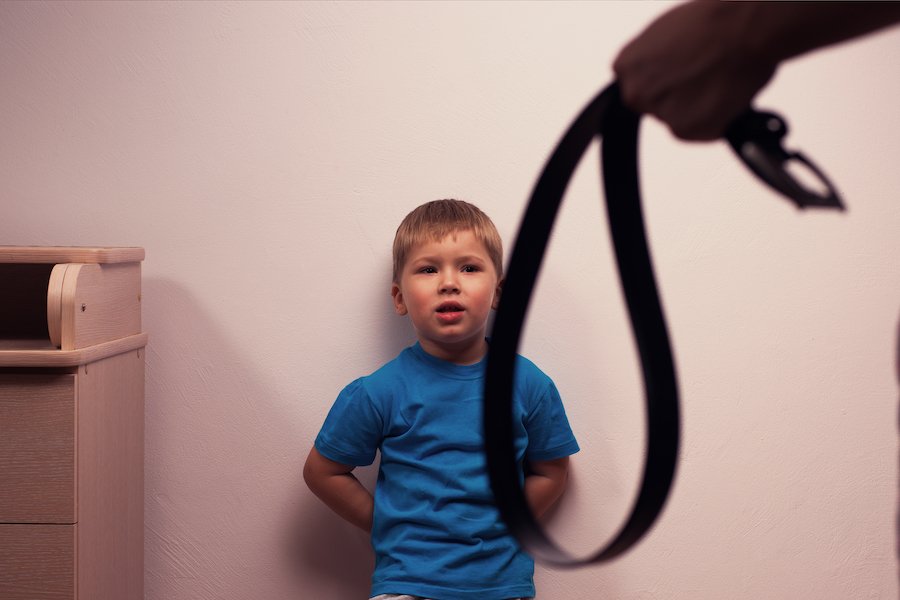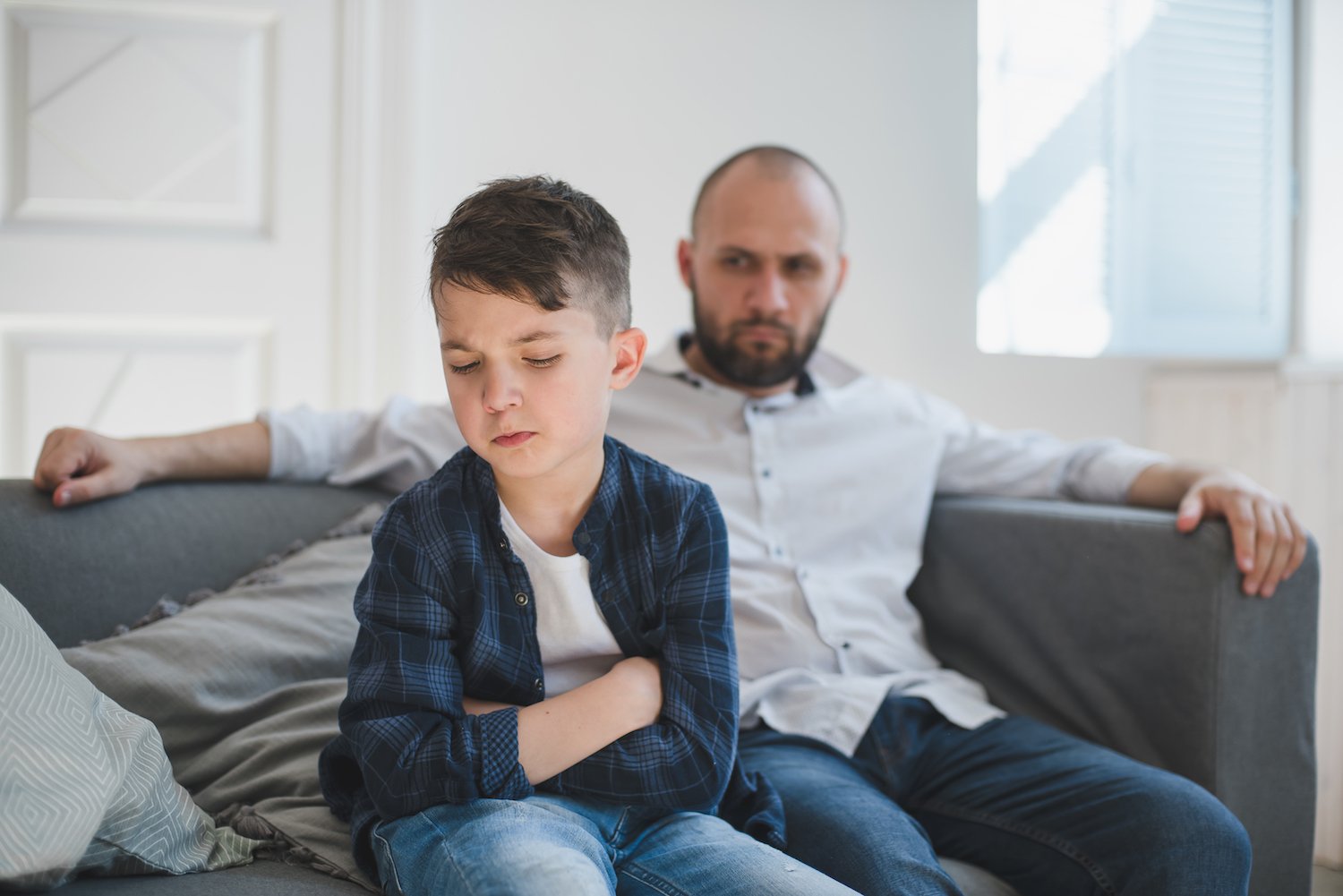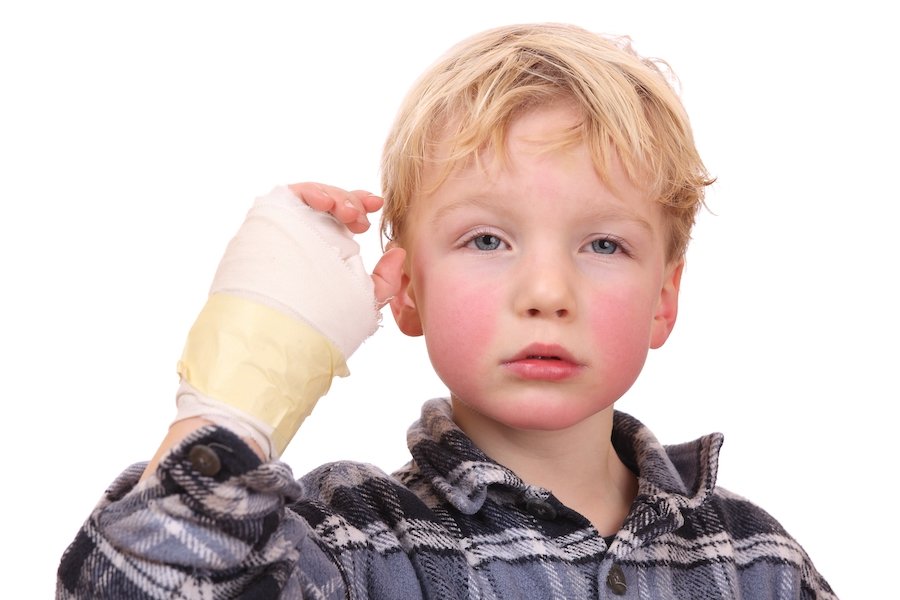Nevada Revised Statute § 200.508 prohibits child abuse, neglect and endangerment, which is willfully causing a minor (a child under the age of 18) to suffer unjustifiable physical pain or mental suffering.

Child abuse is prosecuted as a gross misdemeanor or felony in Nevada depending on the seriousness of the case. Sometimes the judge grants probation instead of incarceration, and it may be possible to plea bargain the charge down to a lesser offense.
It may also be able to get NRS 200.508 charges dismissed by arguing that:
- the incident was an accident,
- you acted in self-defense,
- you were falsely accused, or
- you exercised reasonable parental discipline.
In this article, our Las Vegas criminal defense lawyers will address the following key issues regarding child abuse:
- 1. Elements of NRS 200.508
- 2. Penalties
- 3. Defenses
- 4. How Police Make Arrests
- 5. Do I have to go to court?
- 6. Record Seals
- 7. Immigration Consequences
- 8. Extradition
- 9. Related Crimes
- 10. History of Child Welfare Laws
- 11. Reporting Child Abuse
- Additional Resources
1. Elements of NRS 200.508
For you to be convicted of child abuse in Nevada, prosecutors have to prove beyond a reasonable doubt that you willfully caused or permitted a minor (child under 18 years old) to suffer either:
- physical abuse,
- emotional abuse,
- sexual abuse/ exploitation,
- neglect, or
- endangerment.1
We discuss each of these in detail below.
Note that child abuse is a “general intent” crime, which means you do not have to intend to harm a child or to violate the law for you to be guilty. Instead, you have to intentionally commit the acts that result in harm to the child.
Example: Max belts his son with the intent to discipline him. However, Max belts him so hard the child’s spinal cord gets damaged. Max can be charged with child abuse even though he had no intent to cause such injuries. All that matters is Max intended to belt him dangerously hard.
1) Physical Abuse
It is unlawful in Nevada to commit most forms of battery against a child, such as:
- punching,
- kicking,
- pushing,
- burning,
- crushing,
- cutting,
- strangling,
- throwing an object at a child, or
- anything else causing unjustifiable pain.
However, Nevada law does permit reasonable corporal punishments that are not excessive or physically debilitating, such as spanking or a smack or sending the child to bed without dinner.
Physical abuse against a child typically manifests as an injury, an illness, unjustifiable pain,5 or even a cosmetic disfigurement. To prove the existence of physical abuse, prosecutors often rely on medical records and medical experts.2
Physical Abuse Resulting in Death
In Nevada, an alleged act of child abuse may be charged as first-degree murder if the child dies from the abuse. If the child survives but the alleged abuse was very grave, the charge may then be attempted murder.
Note that if you are accused of an act of child abuse causing death, you may be convicted of only murder or child abuse, not both. This is because “double jeopardy” laws bar you from being convicted of similar crimes for the same criminal act.
However, if you commit more than one act of child abuse and the child dies, then you may be convicted of both murder and child abuse.3 This is because some of the abuse was unrelated to the abuse that caused the child’s death.
Shaken Baby Syndrome
Shaken baby syndrome (“SBS”) is a type of child abuse in which someone shakes a baby violently, usually to quiet them. Also called “Abusive Head Trauma,” SBS can cause severe physical as well as mental injuries and is potentially lethal.
Shaken baby syndrome is charged in Nevada as either child abuse, murder, or attempted murder, depending on the extent of the injuries and whether death occurred. To prove SBS, the state typically shows evidence of brain damage and retinal hemorrhages.4
Abuse or Death of an Unborn Child
Nevada law is still murky about what charges prosecutors may file in cases of unborn children being abused or killed. It seems that the older the fetus is, the more likely wrongful termination is criminal.
Anyone who willfully kills an unborn “quick” child by injuring the mother faces manslaughter charges. Nevada law does not specify how old a “quick” fetus must be, but it is generally believed to mean when the mother feels the fetus move.
However, a pregnant woman in Nevada who ingests illegal substances that then transfer to the fetus via the umbilical cord cannot be charged with child abuse no matter how old the fetus is.5

Nevada law permits corporal punishment as long as it is not excessive.
2) Emotional Abuse
In Nevada, child emotional abuse is behavior that injures a child’s intellectual, psychological, or emotional capacity to the point where their normal range of performance is impaired. Examples of emotional abuse could be the following:
- perpetually telling a child that they are worthless;
- brainwashing or radicalizing a child with destructive or violent ideological beliefs; or
- never allowing a child to go to school, learn, and play.
Mental abuse of a child is usually harder for prosecutors to prove precisely because it is not physical.6 Evidence that prosecutors often rely on includes:
- psychological evaluations that shows hindered development and social skills,
- medical expert testimony,
- school reports that show lacking academic skills, and/or
- witnesses of the child’s behavior.
3) Sexual Abuse & Exploitation
“Sexual abuse against a child” in Nevada includes such sex crimes as
- sexual assault/rape (sex acts with penetration),
- incest,
- lewdness with a child under 16, or
- open or gross lewdness.
State law also prohibits female genital mutilation irrespective of the child’s cultural background.
Note that raping a child technically qualifies as two separate Nevada crimes: 1) child abuse and 2) sexual assault. Though due to “double jeopardy” protections, you can be convicted of either crime but not both if you are accused of sexually assaulting a minor.
Meanwhile, “sexual exploitation of a child” in Nevada typically involves either pimping a child for prostitution (“sex trafficking”) or using a child to make pornography (“child sexual abuse material”) or to exhibit a child in a sexual way.
Note that the age of consent in Nevada is 16 years old. Therefore, it is never a defense that a child under 16 initiated or consented to the sex acts.7
4) Child Neglect
Under Nevada law, child neglect is when you are responsible for a child’s welfare and you either:
- abandon the child, or
- leave the child without proper supervision, food, shelter, medicine, or other necessary care.
Whereas child physical abuse is an unlawful action, child neglect is an unlawful inaction, also called an “act of omission.”8
Example: Every day Dave leaves his son Jim home alone while he goes to work. A concerned neighbor finally calls 911. The police arrest Dave, and the judge determines that Dave neglected Jim because Jim suffered from never going to school. It does not matter Jim has no physical injuries.
Medical Maltreatment
Nevada law permits you to use non-medical remedial treatments to nurse your sick child. However, the following conditions must be met:
- the medical community recognizes the treatment as a suitable alternative, and
- you choose the treatment in good faith.
If a child requires immediate medical attention, however, you face neglect allegations if significant time elapses before seeking professional help.9
Neglect Resulting in Death
Nevada law distinguishes between death resulting from child abuse and death resulting from child neglect: Only deaths allegedly resulting from child abuse may lead to murder charges. Deaths stemming from child neglect are not a basis for murder charges.
Example: Thomas is charged for beating his child to death. Thomas’s battered wife knew Thomas beat the child but was too scared to do anything to stop it. Thomas can be charged with first-degree murder because he directly abused the child. Meanwhile, his wife would probably be charged with child abuse because she did not directly harm the child; rather, she neglected to help him.10
5) Child Endangerment
Child endangerment is putting a child in a situation that jeopardizes their physical or mental health. One example of child endangerment the Nevada Supreme Court recognized is the transportation of a child in a stolen car.11
Other examples of child endangerment in Nevada may include:
- leaving a child with a relative known to be abusive;
- operating a methamphetamine lab in a location where a child is present; or
- letting a child play in a hazardous or dangerous environment.

Willful abuse is punished more severely than permissive abuse.
2. Penalties
As the table below shows, the punishment for child abuse, neglect, or endangerment in Nevada depends on five primary factors:
- whether the alleged abuse was willful or merely allowed to happen,
- whether the child sustained substantial bodily harm (such as disfigurement, fractures, or organ impairment) or substantial mental harm (such as clinical depression or PTSD),
- whether the abuse was sexual (penetration is not necessary),
- whether the child is 13 or younger, and
- whether you are a repeat offender.12
| Child Abuse Penalties in Nevada under NRS 200.508 | |
| The abuse was willful, and substantial bodily or mental harm occurred |
Category A felony if there was sexual abuse or exploitation of a child 13 or younger: Life in prison with the possibility of parole after 15 years and sex offender status. Category B felony in other cases: 2 to 20 years in prison. |
| The abuse was willful, and no substantial bodily or mental harm occurred | Category B felony: 1 to 6 years in prison if you have no prior child abuse convictions; otherwise, 2 to 15 years in prison. |
| The abuse was permitted, and substantial bodily or mental harm occurred | Category A felony if there was sexual abuse or exploitation of a child 13 or younger: Life in prison with the possibility of parole after 10 years and sex offender status.
Category B felony in other cases: 2 to 20 years in prison. |
| The abuse was permitted, and no substantial bodily or mental harm occurred | Gross misdemeanor if you have no prior child abuse convictions: Up to 364 days in jail and/or $2,000.
Category C felony if you have a prior child abuse conviction: 1 to 5 years in prison and up to $10,000. |
Depending on the case, the D.A. may agree to reduce the charges to battery or contributing to the delinquency of a minor. However, prosecutors are typically reluctant to negotiate plea bargains if the injuries are severe.
Note that Nevada prosecutors may refer you to counseling or treatment if they suspect you of child abuse. This is true even if they decide not to prosecute you for child abuse.13

Penalties for violating NRS 200.508 increase if the child sustains an injury.
3. Defenses
Here at Las Vegas Defense Group, we have represented literally thousands of people charged with child abuse in Nevada. The D.A. usually relies on police reports, witnesses, medical records, and records of past abuse to build a case against you.
In our experience, the following seven defenses have proven highly effective in discrediting or outweighing the state’s evidence, as perceived by prosecutors, judges, and juries. This may result in your NRS 200.508 charges getting reduced or dismissed.14
1) The Incident Was an Accident
You are not guilty of child abuse in Nevada if you did not intend to commit the harmful act. If you drop your baby by accident, you have committed no crime because it was unintentional.
It is also not child abuse if the child injures themself in an accident that you could not have reasonably foreseen.15 It is common for kids to sustain injuries from such everyday trip-ups as:
- falling from trees, bikes, and stairs,
- getting hit with bats, racquets, or other kids during sports,
- getting their hands caught in doors or windows, or
- roughhousing with their friends.
In the case of People v. Kevin R., Las Vegas criminal defense attorney Michael Becker won a full acquittal for a man accused of felony “shaken baby” charges. Through his advocacy, he convinced the jury that the child’s injury resulted from a fall that was no one’s fault.
2) You Acted in Self-Defense
Many child abuse cases arise out of adults fending off angry kids or teens who turn violent. It is lawful in Nevada to defend yourself — even against children — as long as the following are true:
- you reasonably believe you are about to be killed or injured;
- you reasonably believe that immediate force is necessary to prevent the danger; and
- you do not use any more force than necessary.16
Expert testimony and witness statements can help demonstrate that you were not the aggressor and acted in line with Nevada self-defense law.
3) You Were Falsely Accused
Sometimes, kids lie that their parents or another adult hurt them. They may be motivated by anger or just an active imagination. Either way, we may be able to show through investigation or cross-examination that your child falsely accused you.
In some cases, troubled or attention-seeking children self-inflict wounds and then claim that a parent did it. In other cases, a vengeful parent may injure the child only to falsely accuse the other parent, hoping to get them into trouble.
In this situation, medical experts may be able to study the medical records and testify as to whether the injuries were self-inflicted. Simple scientific testimony is often highly effective in refuting an accuser’s false allegations.
4) It Was Reasonable Corporal Punishment
You are permitted to discipline your children in the state of Nevada. However, overzealous police officers might misconstrue yelling as verbal abuse or spanking as a battery. They also might presume an injury came from abusive parents rather than an accident.17
We would try to find evidence, such as witnesses or surveillance video, to show that the corporal punishment never crossed the line into abuse. Plus, expert medical witnesses may be able to show that your child’s injuries are unrelated to your discipline.
In the case of People v. Mark O., Las Vegas criminal defense attorney Michael Becker won a full acquittal for a father accused of whipping a child to death. Michael Becker was able to argue and produce medical evidence that the corporal punishment his client inflicted did not cause the fatal injuries.
5) It Was Reasonable Medical Treatment Made in Good Faith
Symptoms can be misleading, and doctors often misdiagnose patients. If a parent does not reasonably know that a child is seriously ill, the parent should not be held liable for not medicating the child quickly or correctly.
As discussed earlier, parents and guardians in Nevada may pursue non-medical remedial treatments to treat ill children as long as:
- Nevada law considers the non-medical treatment a reasonable alternative to prevailing therapies, and
- the parent or guardian elects the non-medical treatment, believing it is in the child’s interest.18
Expert medical witnesses could be instrumental in showing that the parent acted in good faith and was not at fault for the child’s injuries.
6) Abusive Relatives Caused the Harm
One frequent scenario in Las Vegas child abuse cases concerns parents leaving their children with abusive relatives. If the parent had no reason to know the relative was doing the child harm, then the parent committed no child abuse.
7) No Harm Occurred
No child abuse occurred if the child suffered no unjustifiable physical pain or mental suffering. So, if the prosecution cannot prove that the child experienced bodily or emotional harm, the charge should be dismissed.
We typically rely on medical experts and eyewitnesses to show that your actions did not hurt the child.

Substantial mental harm encompasses intellectual, psychological, or emotional damage that is observable and precludes the child from functioning normally.
4. How Police Make Arrests
As with battery domestic violence allegations, many child abuse reports start with 911 calls from the victim or a bystander. In other cases, Child Protective Services in Nevada (CPS) gets a tip that a child may be abused or neglected.
If CPS concludes there is reasonable cause to believe a child is being abused or neglected by you in Nevada, they will classify the findings as “substantiated.” CPS will then notify Nevada law enforcement to orchestrate the removal of the child from the allegedly abusive environment. The police may also arrest and book you at the local jail, where the judge may set bail.
Note that the Child Abuse Prevention and Treatment Act (CAPTA) mandates that professionals such as teachers, doctors, therapists, and clergymen report suspected child abuse and neglect cases in Nevada to CPS.19 CPS accepts anonymous tips as well: Tipsters do not have to provide proof of the alleged abuse.20
5. Do I have to go to court?
If you do not retain private counsel in Nevada, you will have to appear at all court appearances in the case. If you miss a court date, the judge may issue a bench warrant for your arrest.21
If you hire a Nevada attorney, you usually do not have to appear at any court appearances unless the case proceeds to a preliminary hearing or trial.
Nevada judges understand that you are busy with jobs and may live out of state. So as long as you have a Nevada attorney representing you, you can avoid having to appear in court most of the time.

Self-defense is a potential argument to fight child abuse charges.
6. Record Seals
Child abuse convictions that involve sexual abuse or exploitation may never be sealed in Nevada. Otherwise, NRS 200.508 convictions are sealable after a pre-determined wait time:
- category B or C felony convictions of child abuse may be sealed five years after the case closes.
- gross misdemeanor convictions of child abuse may be sealed two years after the case closes.
However, if your child abuse charge gets dismissed, then you may be able to petition for a record seal right away.22
Note that the Nevada Central Repository maintains records of substantiated reports of child abuse or neglect. Employers can request a Child Abuse and Neglect check (CANS check) for prospective employees if:
- you, as the job applicant, provide written authorization allowing the background check, and
- the employer is required to by law, or the prospective job involves being around children or the elderly.23
7. Immigration Consequences
In some cases, immigration law regards child abuse as a deportable offense. Therefore, the Department of Homeland Security may deport non-citizens convicted of child abuse.24
Non-citizens charged with a crime are advised to retain counsel with experience in immigration and criminal defense. It may be possible to get the charge reduced to a non-deportable crime.
8. Extradition
Child abuse suspects who flee to another state can be apprehended and brought back to Nevada.25 If you are arrested out-of-state, you will have the choice either to:
- waive extradition and return to Nevada or
- remain in the asylum state and fight extradition.
If you decide to fight extradition, you are entitled to a hearing where you typically make the following arguments:
- the governor’s warrant ordering the extradition is invalid; and/or
- you are not the person sought in the governor’s warrant
Note that extradition procedures differ from state to state. For instance, Hawaii and Florida may release suspects on bail pending extradition. Though others like California probably will not.

Child abuse that results in substantial physical or mental harm carries harsher punishments.
9. Related Crimes
Possessing Child Pornography
Possession of child pornography depicting children under 16 is a category B felony, carrying one to six years in prison and up to $5,000 in fines. Any subsequent offense is a category A felony, punishable by:
- 1 year to a life sentence with the possibility of parole and
- up to $5,000 in fines.26
Statutory Rape (“Statutory Sexual Seduction”)
Nevada prohibits statutory rape, which is when a person 18 or older has sex with a child aged 15 or 14 and there is at least a four-year age difference.
If you are 21 or older, statutory rape is a category B felony carrying one to 10 years in prison and up to $10,000. Otherwise, it is usually a gross misdemeanor carrying:
- up to 364 days in jail, and/or
- up to $2,000 in fines.27
Furnishing Alcohol to a Minor
It is a misdemeanor to knowingly furnish or sell alcohol to a person under 21. The penalty is up to six months in jail and/or $1,000.
Note that this law does not apply to the minor’s parents, doctors, or guardians.28
Leaving a Child Unattended in a Car
It is a crime in Nevada to knowingly leave a child under eight in a car in risky conditions (such as high heat) or if the car is running. As long as the child is unharmed, it carries the misdemeanor penalties of:
- up to 6 months in jail and/or
- up to $1,000 in fines.
Otherwise, this offense is prosecuted as child endangerment.29
10. History of Child Welfare Laws
- 1975: The Nevada Legislature passed laws governing the reporting and investigation of child abuse and the establishment of the Nevada Central Registry.
- 1985: The Nevada Legislature passed the Child Protection Act, outlining new stringent requirements for the welfare division.
- 1987: Nevada passed a law requiring counties of 100,000 or more people to provide child protective services.
- 1997: New legislation redefined CPS procedures and mandated immediate responses for reports regarding children five years old and younger.
- 1999: Nevada legislation implemented the federal Adoption and Safe Families Act (ASFA) to promote child havens.30
11. How do I report suspected child abuse?
To report suspected child abuse in Nevada, call Child Protective Services at:
- Las Vegas: 702-399-0081
- Reno: 775-785-8600
- Elko: 775-753-1399
Or else call Childhelp National Child Abuse Hotline at 1-800-422-4453.

Sometimes children make up lies about child abuse, not realizing the implications.
Additional Resources
If you or someone you know is in immediate crisis, call 911. You can find further helpful information here:
- ChildAbuse.com – Another resource page with articles and links for the prevention of child abuse.
- Prevent Child Abuse Nevada (PCA Nevada) – Provides services and advocacy statewide for the prevention of child abuse in Nevada.
- Child Abuse Hotline in Clark County, Nevada – (702) 399-0081 or [email protected].
- National Center on Shaken Baby Syndrome – Information about SBS.
- Children’s Advocacy Centers of Nevada – An organization dedicated to helping victimized children.
Learn more about Nevada child abuse lawyers.
Legal References:
- NRS 200.508. – Abuse, neglect or endangerment of child: Penalties; definitions.
1. A person who willfully causes a child who is less than 18 years of age to suffer unjustifiable physical pain or mental suffering as a result of abuse or neglect or to be placed in a situation where the child may suffer physical pain or mental suffering as the result of abuse or neglect:
(a) If substantial bodily or mental harm results to the child:
(1) If the child is less than 14 years of age and the harm is the result of sexual abuse or exploitation, is guilty of a category A felony and shall be punished by imprisonment in the state prison for life with the possibility of parole, with eligibility for parole beginning when a minimum of 15 years has been served; or
(2) In all other such cases to which subparagraph (1) does not apply, is guilty of a category B felony and shall be punished by imprisonment in the state prison for a minimum term of not less than 2 years and a maximum term of not more than 20 years; or
(b) If substantial bodily or mental harm does not result to the child:
(1) If the person has not previously been convicted of a violation of this section or of a violation of the law of any other jurisdiction that prohibits the same or similar conduct, is guilty of a category B felony and shall be punished by imprisonment in the state prison for a minimum term of not less than 1 year and a maximum term of not more than 6 years; or
(2) If the person has previously been convicted of a violation of this section or of a violation of the law of any other jurisdiction that prohibits the same or similar conduct, is guilty of a category B felony and shall be punished by imprisonment in the state prison for a minimum term of not less than 2 years and a maximum term of not more than 15 years,
Ê unless a more severe penalty is prescribed by law for an act or omission that brings about the abuse or neglect.
2. A person who is responsible for the safety or welfare of a child pursuant to NRS 432B.130 and who permits or allows that child to suffer unjustifiable physical pain or mental suffering as a result of abuse or neglect or to be placed in a situation where the child may suffer physical pain or mental suffering as the result of abuse or neglect:
(a) If substantial bodily or mental harm results to the child:
(1) If the child is less than 14 years of age and the harm is the result of sexual abuse or exploitation, is guilty of a category A felony and shall be punished by imprisonment in the state prison for life with the possibility of parole, with eligibility for parole beginning when a minimum of 10 years has been served; or
(2) In all other such cases to which subparagraph (1) does not apply, is guilty of a category B felony and shall be punished by imprisonment in the state prison for a minimum term of not less than 2 years and a maximum term of not more than 20 years; or
(b) If substantial bodily or mental harm does not result to the child:
(1) If the person has not previously been convicted of a violation of this section or of a violation of the law of any other jurisdiction that prohibits the same or similar conduct, is guilty of a gross misdemeanor; or
(2) If the person has previously been convicted of a violation of this section or of a violation of the law of any other jurisdiction that prohibits the same or similar conduct, is guilty of a category C felony and shall be punished as provided in NRS 193.130,
Ê unless a more severe penalty is prescribed by law for an act or omission that brings about the abuse or neglect.
3. A person does not commit a violation of subsection 1 or 2 by virtue of the sole fact that the person delivers or allows the delivery of a child to a provider of emergency services pursuant to NRS 432B.630.
4. As used in this section:
(a) “Abuse or neglect” means physical or mental injury of a nonaccidental nature, sexual abuse, sexual exploitation, negligent treatment or maltreatment of a child under the age of 18 years, as set forth in paragraph (d) and NRS 432B.070, 432B.100, 432B.110, 432B.140 and 432B.150, under circumstances which indicate that the child’s health or welfare is harmed or threatened with harm.
(b) “Allow” means to do nothing to prevent or stop the abuse or neglect of a child in circumstances where the person knows or has reason to know that the child is abused or neglected.
(c) “Permit” means permission that a reasonable person would not grant and which amounts to a neglect of responsibility attending the care, custody and control of a minor child.
(d) “Physical injury” means:
(1) Permanent or temporary disfigurement; or
(2) Impairment of any bodily function or organ of the body.
(e) “Substantial mental harm” means an injury to the intellectual or psychological capacity or the emotional condition of a child as evidenced by an observable and substantial impairment of the ability of the child to function within his or her normal range of performance or behavior.
See also AB 183 (2023). Rice v. State (1997) 113 Nev. 1300, 949 P.2d 262 (“The child abuse statute is a general intent crime.”). Childers v. State (1984) 100 Nev. 280, 680 P.2d 598 (“The word “willfully”, when applied to the intent with which an act is done or omitted, as used in my instructions, implies simply a purpose or willingness to commit the act or to make the omission in question. The word does not require in its meaning any intent to violate law, or to injure another, or to acquire any advantage.”). - NRS 432B.150. NRS 432B.090 “Physical injury” defined. “Physical injury” includes, without limitation:
- A sprain or dislocation;
- Damage to cartilage;
- A fracture of a bone or the skull;
- An intracranial hemorrhage or injury to another internal organ;
- A burn or scalding;
- A cut, laceration, puncture or bite;
- Permanent or temporary disfigurement; or
- Permanent or temporary loss or impairment of a part or organ of the body.
Levi v. State (1979) 95 Nev. 746, 602 P.2d 189 (“In our view, the phrase, “serious permanent disfigurement,” includes cosmetic disfigurement as well as an injury that is functionally disabling.”). Bludsworth v. State (1982) 98 Nev. 289, 646 P.2d 558; Matschke J, Voss J, Obi N, Gorndt J, Sperhake JP, Puschel K, Glatzel M., Nonaccidental head injury is the most common cause of subdural bleeding in infants <1 year of age, Pediatrics. 2009 Dec;124(6):1587-94. (“Subdural bleeding (SDB) in infants is considered an essential symptom of nonaccidental head injury (NAHI).”). - Nevada A.B. 782 (May 16, 1989) (“…providing that murder by abuse of a child is murder of the first degree…”). NRS 200.030. Athey v. State (1990) 106 Nev. 520, 797 P.2d 956. Bludsworth v. State, (1982) 98 Nev. 289, 646 P.2d 558 (“The child abuse and murder counts were properly joined since they arose out of the same series of acts.”); see also High Desert State Prison v. Sanchez, (2019) 454 P.3d 1270, 135 Nev. Adv. Rep. 68.
- Shaken Baby Syndrome Given New Name, Area Health Education Center of Southern Nevada press release (April 29, 2009). Child killer’s conviction overturned, Las Vegas Sun (December 5, 2000). Wegner v. State, (2000) 116 Nev. 1149, 14 P.3d 25 (“Dr. Marietta Nelson, a pediatric ophthalmologist, who reviewed only the autopsy reports, testified that the retinal hemorrhages were a classic sign of shaken baby syndrome. Dr. Nelson testified that the injury was of a non-accidental nature with hemorrhages that must have appeared quickly after the injury.”).
- NRS 200.210. Glenn Puit, DEATH OF FETUS: Las Vegas man faces charges: Viability of fetus to survive outside womb might be key, Las Vegas Review-Journal (December 09, 2002). Sheriff, Washoe County, Nev. v. Encoe, (1994) 110 Nev. 1317, 885 P.2d 596 (“NRS 200.508 does not apply to a pregnant woman’s ingestion of illegal substances and the resulting transmission of these substances to her child through the umbilical cord. We conclude that if the Nevada legislature intended to criminalize prenatal substance abuse, it would have enacted a statute to that effect.”).
- NRS 432B.070 “Mental injury” defined. “Mental injury” means an injury to the intellectual or psychological capacity or the emotional condition of a child as evidenced by an observable and substantial impairment of his ability to function within his normal range of performance or behavior. NRS 432B.070 “Mental injury” defined. “Mental injury” means an injury to the intellectual or psychological capacity or the emotional condition of a child as evidenced by an observable and substantial impairment of his ability to function within his normal range of performance or behavior. Rees CA, Understanding emotional abuse, Arch Dis Child. 2010 Jan;95(1):59-67. (“Difficulties in recognition, definition and legal proof put children at risk of remaining in damaging circumstances.”).
- NRS 201.210. NRS 200.5083. NRS 200.364. Fifth Amendment, U.S. Constitution. NRS 432B.110 “Sexual exploitation” defined.
“Sexual exploitation” includes forcing, allowing or encouraging a child
- To solicit for or engage in prostitution;
- To view a pornographic film or literature; and
- To engage in (a) Filming, photographing or recording on videotape; or (b) Posing, modeling, depiction or a live performance before an audience, which involves the exhibition of a child’s genitals or any sexual conduct with a child, as defined in NRS 200.700.
- NRS 432B.140; see Newson v. State (2020) 462 P.3d 246. King v. State, (1989) 105 Nev. 373, 784 P.2d 942.
- NRS 200.5085. Martineau v. Angelone, (9th Cir.1994) 25 F.3d 734.
- Labastida v. State, (1999) 115 Nev. 298, 986 P.2d 443.
- Hughes v. State (1996) 112 Nev. 84, 910 P.2d 254.
- NRS 200.508. NRS 200.5083.
- Nevada battery can be as minor as a misdemeanor if no substantial injuries occurred and no weapon was used. NRS 201.110. NRS 200.5081.
- Another defense to the child abuse statute is that the law is unconstitutionally vague, but the Nevada Supreme Court has rejected this argument in Bludsworth v. State (1982) 98 Nev. 289, 646 P.2d 558.
- NRS 432B.020.
- Runion v. State (2000) 116 Nev. 1041, 13 P.3d 52.
- NRS 432B.150.
- Martineau v. Angelone (9th Cir. 1994) 25 F.3d 734. NRS 200.5085.
- NRS 432B.220. NRS 432B.230.
- Child Abuse and Prevention Treatment Act, 42 USC Sec. 5101, Title 42, Chapter 67.
- NRS 199.335.
- NRS 179.245. NRS 179.255.
- Nevada Senate Bill 296 (2005). NRS 432.100.
- 8 U.S.C. § 1227 (a)(2)(E)(i) (“Any alien who at any time after admission is convicted of a crime of domestic violence, a crime of stalking, or a crime of child abuse, child neglect, or child abandonment is deportable.”). See also Alvarez-Cerriteno v. Sessions, (9th Cir. 2018) 899 F.3d 774; Garcia v. Attorney General, (11th Cir. 2003) 329 F.3d 1217 (aggravated child abuse in Florida was a CIMT); Gonzalez-Alvarado v. INS, (9th Cir. 1994) 39 F.3d 245; Castle v. INS, (4th Cir. 1976) 541 F.2d 1064; Marciano v. INS, (8th Cir. 1971) 450 F.2d 1022 (statutory rape is a CIMT).
- NRS 179.221.
- NRS 200.730.
- NRS 200.368.
- NRS 202.055.
- NRS 202.485.
- Nevada A.B. 108 (January 29, 1975). NRS 432B. Nevada A.B. 861 (June 2, 1987).

